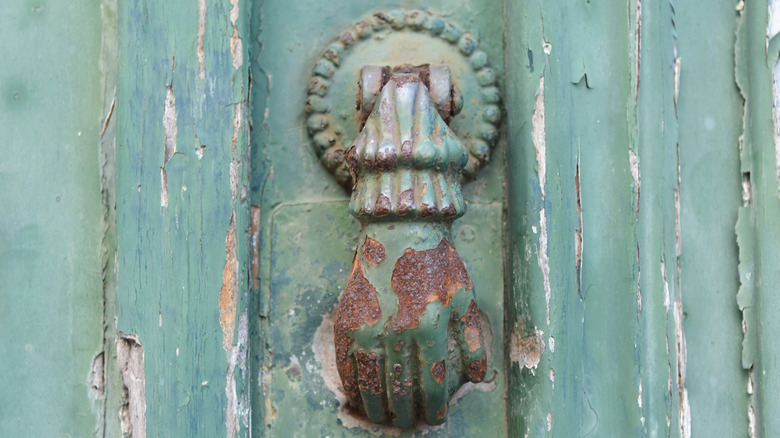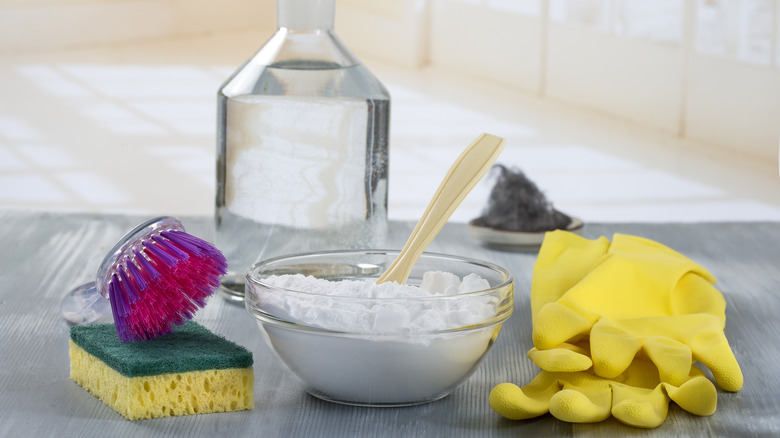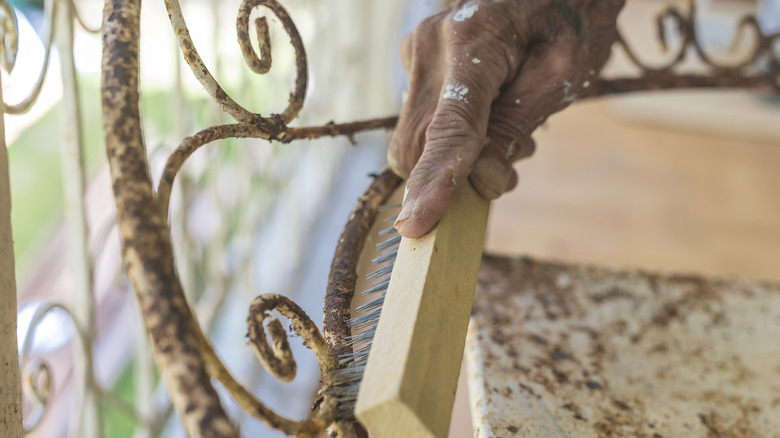Naturally Remove Paint From Metal Surfaces With This Common Household Ingredient
We may receive a commission on purchases made from links.
If your home's previous owner entered into a trance while holding a paintbrush and painted over all the hardware throughout your home, you might feel inspired to rescue those treasures. Thankfully, if you have paint-splotched locks, kitchen cabinet pulls, door hinges, knockers, or tools, you can do something about it. One option is to purchase chemical-based paint thinners, but the toxicity could be problematic, especially if your area isn't well-ventilated. Instead, try a combination of vinegar and baking soda, items you likely have in your kitchen cabinet.
If you're ready to give your old hardware some new life, grab your versatile white vinegar from the pantry (or buy a new bottle for $4 at Walmart) to remove paint from metal. Typically, stripping paint off a metal surface is the ideal way to start a refinishing project since applying another layer of thick paint over the top of some surfaces, like the edge of a door, will create functional problems. You could use paint strippers or even angle grinders for this job, but vinegar's ability to dissolve the link between the paint and the metal surface makes it an effective but all-natural option instead.
It's still a good idea to wear gloves and use eye protection for this process to minimize risks. Keep the kids and pets out of the area, and open the windows or handle this project outdoors to ensure proper ventilation. Once you do that, take one more step to ensure you're not working with lead-based paint, especially if the object was painted before 1960.
Why vinegar and baking soda work so well at removing paint
The reason paint may wipe right off of a metal surface, even if it's been on there a long time, is due to the combination of vinegar and baking soda. This chemical reaction creates bubbles of carbon dioxide gas. More specifically, the hydrogen ions in the vinegar will create an instant reaction with the bicarbonate ions and the sodium within the baking soda. That fizzing and bubble action is exactly what you want to see.
When that chemical reaction occurs, it allows for the link between the paint on the surface of the metal to break. As that breakdown happens, the paint becomes loosened and can be removed often by just wiping it away. The baking soda works to dissolve any organic material on the surface of the metal. Then, the acid in vinegar breaks down the minerals there, allowing layers of paint to loosen from the surface.
This process works as a type of cleaning agent. Because these components have opposite pH levels, they interact very easily, and when you mix them, that complicated molecular structure change goes to work for you. While this may seem like too much science, this natural method of removing paint from metal can be done simply and often within just a few minutes (and it may cost less than buying chemical paint thinners and require far less time than using a grinder over every inch of the surface).
How to use vinegar and baking soda to strip paint from metal
Once you've put on your goggles and moved to a ventilated area, the process of removing paint from metal using vinegar is simple. Move the metal object in a way that allows the fluid to remain flat so it can puddle on the surface for several minutes. Heat about 2 ounces of white vinegar in a pan with about 4 cups of water for the best results. You can add more vinegar for multiple layers. Once this warms and begins to boil, transfer it to the metal surface. You could put small items, like hinges or doorknobs, directly into the warm mixture once removed from the heat. Otherwise, apply the warmed mixture to the surface of the metal and allow it to sit before scrubbing with a metal wire brush.
If the hardware isn't stripped to your satisfaction, rinse off the item and try a slightly different alternative. You can start over with water and baking soda using the same 1-quart to 1/4-cup proportions and the same directions. We also recommend this as a backup method for two reasons: It's not only a reliable paint stripper, but it's also more alkaline and gentler on your metal for a second round. A cautionary note: Straight vinegar dissolves zinc quickly, and lead, copper, aluminum, and iron slowly. Keep that in mind if you leave your hardware in the vinegar solution for longer than the recommended 15 minutes.


